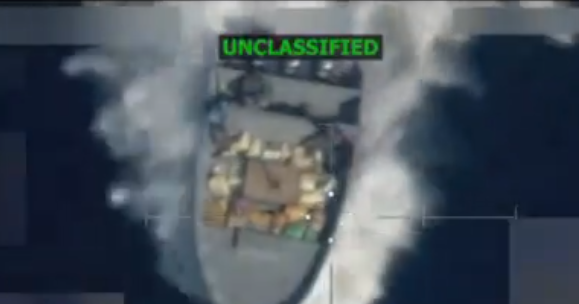In a significant escalation of military operations, the U.S. military targeted and struck a vessel suspected of drug trafficking in the Caribbean Sea, resulting in the deaths of four individuals onboard. This latest operation, which follows a series of similar strikes since September, has raised concerns regarding legality and the potential for extrajudicial killings as officials emphasize a commitment to combating drug trafficking. Amidst these developments, U.S. military presence in the region is reinforcing its strategy, drawing scrutiny and debate both domestically and internationally.
| Article Subheadings |
|---|
| 1) Overview of Recent Military Strikes |
| 2) Operations Under Operation Southern Spear |
| 3) Legal Implications and International Response |
| 4) U.S. Military Buildup in the Region |
| 5) Venezuela’s Response and the Wider Implications |
Overview of Recent Military Strikes
On Monday, the U.S. military conducted a strike against an alleged drug-trafficking vessel in the Caribbean Sea, confirmed by a Pentagon official. This incident represents a continuation of a series of military operations aimed at disrupting drug trafficking networks. Since September, U.S. forces have reportedly destroyed at least 21 vessels in 20 different strikes, leading to the deaths of approximately 80 individuals believed to be involved in drug trafficking. These operations, framed as part of a broader initiative to curb drug smuggling into the United States, seem to have gained momentum under the current administration.
Operations Under Operation Southern Spear
The strike on Monday is part of a coordinated effort labeled “Operation Southern Spear,” according to Defense Secretary Pete Hegseth. This operation encompasses targeting known trafficking routes used by what officials describe as “narco-terrorists.” Though specifics regarding the evidence against these vessels have not been fully disclosed, the administration asserts that these actions are integral to enhancing national security and combating drug-related issues. The timing and intensity of the operations suggest an escalated focus on regions identified as key transit points for drug smuggling.
Legal Implications and International Response
As these military actions continue, questions surrounding their legality arise. Some experts have voiced concerns that the strikes may violate international law despite targeting recognized drug traffickers. Following the latest strikes, the U.N. human rights chief, Volker Türk, emphasized the need for an investigation into the legality of the military operations, pointing out “strong indications” of potential “extrajudicial killings.” As international observers urge a thorough examination of the actions taken by U.S. forces, the administration is confronted with growing scrutiny both domestically and from human rights organizations.
U.S. Military Buildup in the Region
The operational strategies are complemented by an observable military buildup in the Caribbean region. The U.S. Department of Defense has confirmed the deployment of the nuclear-powered aircraft carrier USS Gerald Ford, described as the world’s largest and most advanced aircraft carrier, alongside other warships. This repositioning of naval assets indicates a strategic commitment to enhance military readiness and operational capabilities in the Southern Command’s area of responsibility. Such maneuvers signal the U.S.’s intent to assert its influence in the region amidst rising tensions.
Venezuela’s Response and the Wider Implications
In reaction to the U.S. military’s increased presence and ongoing strikes, Venezuela has announced a massive military exercise involving around 200,000 forces nationwide. President Nicolas Maduro and various analysts have characterized the U.S. military pressure as an attempt to destabilize the current government. Furthermore, President Gustavo Petro of Colombia has ordered a halt to intelligence cooperation with the U.S. as long as the strikes persist, exacerbating regional tensions. This increasing military activity raises the stakes for diplomatic relations in Latin America, challenging the balance of power in the region.
| No. | Key Points |
|---|---|
| 1 | The U.S. military executed a strike on a drug trafficking boat, resulting in four deaths. |
| 2 | Operation Southern Spear aims to undermine drug trafficking networks in the Caribbean. |
| 3 | Legal concerns have emerged regarding the possible violations of international law. |
| 4 | The USS Gerald Ford and additional warships are positioned in the region, enhancing military readiness. |
| 5 | Venezuela has initiated military exercises in response to U.S. activities, heightening regional tensions. |
Summary
The recent U.S. military strike against an alleged drug-trafficking vessel underscores a strategic escalation in the fight against drug smuggling operations. As the military operations under Operation Southern Spear continue to target suspected networks in the Caribbean, the situation raises critical legal and diplomatic questions. Furthermore, Venezuela’s corresponding military exercises and Colombia’s intelligence halt signal deepening tensions in the region, illustrating the complex interplay of military, political, and humanitarian concerns that will likely evolve in future engagements.
Frequently Asked Questions
Question: What is Operation Southern Spear?
Operation Southern Spear is a U.S. military initiative aimed at disrupting drug trafficking operations in the Caribbean and Pacific regions, targeting vessels believed to be involved in smuggling activities.
Question: Why are there concerns about the legality of the strikes?
Experts caution that the U.S. strikes could violate international law, as they raise issues related to potential extrajudicial killings and the lack of transparent evidence regarding the threats posed by the targeted vessels.
Question: How has Venezuela reacted to the U.S. military presence?
Venezuela has launched a large-scale military exercise and halted intelligence sharing with the U.S. in response to increased military pressure, perceiving these actions as direct threats to its sovereignty.
